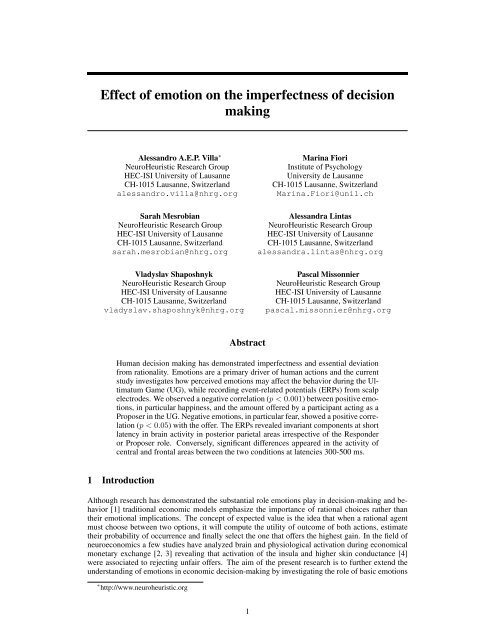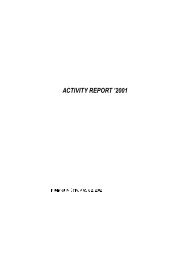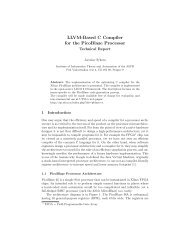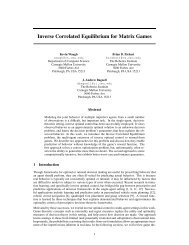Effect <strong>of</strong> emotion on the <strong>imperfect</strong>ness <strong>of</strong> <strong>decision</strong><strong>making</strong>Alessandro A.E.P. Villa ∗NeuroHeuristic Research GroupHEC-ISI University <strong>of</strong> LausanneCH-1015 Lausanne, Switzerlandalessandro.villa@nhrg.orgSarah MesrobianNeuroHeuristic Research GroupHEC-ISI University <strong>of</strong> LausanneCH-1015 Lausanne, Switzerlandsarah.mesrobian@nhrg.orgVladyslav ShaposhnykNeuroHeuristic Research GroupHEC-ISI University <strong>of</strong> LausanneCH-1015 Lausanne, Switzerlandvladyslav.shaposhnyk@nhrg.orgMarina Fiori<strong>Institute</strong> <strong>of</strong> PsychologyUniversity de LausanneCH-1015 Lausanne, SwitzerlandMarina.Fiori@unil.chAlessandra LintasNeuroHeuristic Research GroupHEC-ISI University <strong>of</strong> LausanneCH-1015 Lausanne, Switzerlandalessandra.lintas@nhrg.orgPascal MissonnierNeuroHeuristic Research GroupHEC-ISI University <strong>of</strong> LausanneCH-1015 Lausanne, Switzerlandpascal.missonnier@nhrg.orgAbstractHuman <strong>decision</strong> <strong>making</strong> has demonstrated <strong>imperfect</strong>ness and essential deviationfrom rationality. Emotions are a primary driver <strong>of</strong> human actions and the currentstudy investigates how perceived emotions may affect the behavior during the UltimatumGame (UG), while recording event-related potentials (ERPs) from scalpelectrodes. We observed a negative correlation (p < 0.001) between positive emotions,in particular happiness, and the amount <strong>of</strong>fered by a participant acting as aProposer in the UG. Negative emotions, in particular fear, showed a positive correlation(p < 0.05) <strong>with</strong> the <strong>of</strong>fer. The ERPs revealed invariant components at shortlatency in brain activity in posterior parietal areas irrespective <strong>of</strong> the Responderor Proposer role. Conversely, significant differences appeared in the activity <strong>of</strong>central and frontal areas between the two conditions at latencies 300-500 ms.1 IntroductionAlthough research has demonstrated the substantial role emotions play in <strong>decision</strong>-<strong>making</strong> and behavior[1] traditional economic models emphasize the importance <strong>of</strong> rational choices rather thantheir emotional implications. The concept <strong>of</strong> expected value is the idea that when a rational agentmust choose between two options, it will compute the utility <strong>of</strong> outcome <strong>of</strong> both actions, estimatetheir probability <strong>of</strong> occurrence and finally select the one that <strong>of</strong>fers the highest gain. In the field <strong>of</strong>neuroeconomics a few studies have analyzed brain and physiological activation during economicalmonetary exchange [2, 3] revealing that activation <strong>of</strong> the insula and higher skin conductance [4]were associated to rejecting unfair <strong>of</strong>fers. The aim <strong>of</strong> the present research is to further extend theunderstanding <strong>of</strong> emotions in economic <strong>decision</strong>-<strong>making</strong> by investigating the role <strong>of</strong> basic emotions∗ http://www.neuroheuristic.org1
(happiness, anger, fear, disgust, surprise, and sadness) in the <strong>decision</strong>-<strong>making</strong> process. To analyzeeconomic <strong>decision</strong>-<strong>making</strong> behavior we used the Ultimatum Game (UG) task [5] while recordingEEG activity. This task has been widely used to investigate human interaction, in particular the differencesbetween behavior expected according to the ‘rational’ model <strong>of</strong> game theory and observed‘irrational’ behavior. One hypothesis that has been suggested to explain this divergence is that participantstend to engage in the ‘tit-for-tat’ type <strong>of</strong> choice establishing a sort <strong>of</strong> reciprocity rule [6]. Inorder to examine potential interaction effects between reciprocity rules and emotions we employedrepetitive trials to analyze the evolution <strong>of</strong> participants’ strategy along the game. In addition, weanalyzed the role <strong>of</strong> individual differences, in particular the personality characteristic <strong>of</strong> honestyand the tendency to experience positive and negative emotions, as factors potentially affecting themonetary choice. [7].2 Materials and methods2.1 Behavioral paradigmWe administered participants some questionnaire to measure their personality traits (the Hexaco personalityquestionnaire, [8]) as well as their tendency to experience positive and negative affect (thePANAS scale [9]). The Ultimatum Game (UG) is an anonymous, single-shot two-player game, inwhich the “Proposer” (Player 1) has a certain sum <strong>of</strong> money at his disposal and must propose a shareto the “Responder” (Player 2) [5]. The Responder can either accept or reject this <strong>of</strong>fer. If the Responderaccepts the proposal, the share is done accordingly. However, if the Responder refuses, bothplayers end up <strong>with</strong> nothing. In either case the game ends after the Responder’s <strong>decision</strong>. The Subjectswere comfortably seated in a sound- and light-attenuated room, watched a computer-controlledmonitor at a distance <strong>of</strong> 57 cm, and were instructed to maintain their gaze on a central fixation crossthroughout the experiment. Subjects volunteered to participate in the study and played <strong>with</strong> virtualmoney. They were tested along three series, each one composed <strong>of</strong> 2 Blocks. During the first Blockthe participants acted as Proposers (Fig. 1a), while during the second Block the computer made the<strong>of</strong>fer and the participants acted as Responders (Fig. 1b). Each Block was composed by 30 trials,which means that 90 trials were collected overall for each condition. The task was implemented ona personal computer using the E-Prime s<strong>of</strong>tware (Psychology S<strong>of</strong>tware Tools, Inc., Sharpsburg, PA15215-2821 USA).abFigure 1: Illustration <strong>of</strong> Ultimatum Game task along series composed <strong>of</strong> 2 Blocks. During the firstBlock the participants acted as Proposers (a), while during the second Block the computer made the<strong>of</strong>fer and the humans acted as Responders (b).Participants were subtly primed <strong>with</strong> emotional figures while <strong>making</strong> the <strong>decision</strong> to share money<strong>with</strong>, or accept the <strong>of</strong>fer <strong>of</strong>, an hypothetical partner. Becoming aware <strong>of</strong> an emotional state mayhinder its effect on subsequent behavior. Thus, we instructed participants to make their economic<strong>decision</strong> while keeping in the background emotional images, which were meant to induce different2
- Page 1 and 2: The 2nd International Workshop onDE
- Page 3 and 4: The 2nd International Workshop onDE
- Page 5 and 6: Time Title Authors7:30—7:50 Openi
- Page 7 and 8: Modeling Humans as Reinforcement Le
- Page 9 and 10: solution concept used to predict th
- Page 11 and 12: an ɛ-greedy policy parameterizatio
- Page 13 and 14: Automated Explanations for MDP Poli
- Page 15 and 16: V E = ∑ i∈Eλ π∗s 0(sc i )
- Page 17 and 18: Figure 1: User Perception of MDP-Ba
- Page 19 and 20: [9] Warren B. Powell. Approximate D
- Page 21 and 22: information (technological knowledg
- Page 23 and 24: The complete fulfilment of preferen
- Page 25: References[1] J.O. Berger. Statisti
- Page 30 and 31: David H Wolpert, editors, Decision
- Page 32 and 33: on some of their concepts, we devel
- Page 34 and 35: We assume that they are evaluated t
- Page 36 and 37: AcknowledgmentsResearch supported b
- Page 38 and 39: Bayesian Combination of Multiple, I
- Page 40 and 41: is not in closed form [5], requirin
- Page 42 and 43: where α (k)j is updated by adding
- Page 44 and 45: Figure 3: Prototypical confusion ma
- Page 46 and 47: Artificial Intelligence Designfor R
- Page 48 and 49: the game. Each has its own attribut
- Page 50 and 51: 4.3 Experimental Results and Limita
- Page 52 and 53: Distributed Decision Making byCateg
- Page 54 and 55: q 1a 1 (1) b 1(1)a 2(1)b 2(1)a K(1)
- Page 56 and 57: Bayes risk0.250.20.150.10.05Collabo
- Page 58 and 59: Decision making and working memory
- Page 60 and 61: in WM as well as inhibitory tasks [
- Page 62 and 63: Difficulty level will be automatica
- Page 64 and 65: Overall, the current literature lea
- Page 66 and 67: [31] W K Bickel, R Yi, R D Landes,
- Page 68 and 69: Each time instant, the agents first
- Page 70 and 71: Figure 2: Two basic decentralized a
- Page 72 and 73: [11] M. Kárný and T.V. Guy. Shari
- Page 74 and 75: these results yields a design metho
- Page 76 and 77:
Minimum of (16) is well known from
- Page 78 and 79:
Algorithm 2 VB-DP variant of the di
- Page 80 and 81:
Further simplications can be achiev
- Page 82 and 83:
The basic terms we use are as follo
- Page 84 and 85:
3 Connection to the Bayesian soluti
- Page 86 and 87:
4 ConclusionThis paper brings an im
- Page 88 and 89:
2 Dynamic programming and revisions
- Page 90 and 91:
The possible way how to recognize t
- Page 92 and 93:
The data used for experiment are da
- Page 95:
T.V. Guy, Institute of Information







